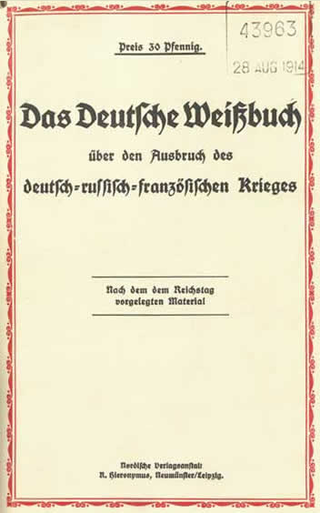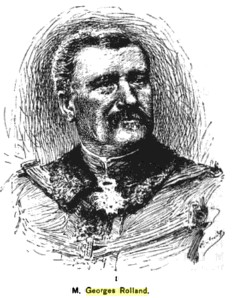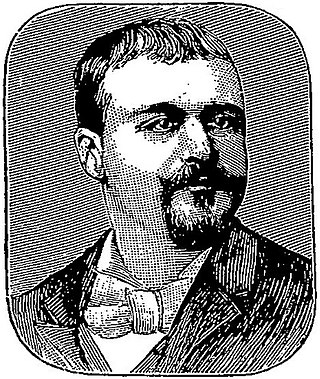Related Research Articles

In the 19th century France built a new French colonial empire second only to the British Empire. It was humiliated in the Franco-Prussian War of 1870–71, which marked the rise of Germany to dominance in Europe. France allied with Great Britain and Russia and was on the winning side of the First World War. Although it was initially easily defeated early in the Second World War, Free France, through its Free French Forces and the Resistance, continued to fight against the Axis powers as an Allied nation and was ultimately considered one of the victors of the war, as the allocation of a French occupation zone in Germany and West Berlin testifies, as well as the status of permanent member of the United Nations Security Council. It fought losing colonial wars in Indochina and Algeria. The Fourth Republic collapsed and the Fifth Republic began in 1958 to the present. Under Charles de Gaulle it tried to block American and British influence on the European community. Since 1945, France has been a founding member of the United Nations, of NATO, and of the European Coal and Steel Community. As a charter member of the United Nations, France holds one of the permanent seats in the Security Council and is a member of most of its specialized and related agencies.

Albert Auguste Gabriel Hanotaux, known as Gabriel Hanotaux was a French statesman and historian who was France's Minister of Foreign Affairs from 1894 to 1895 and 1896 to 1898.

The Entente Cordiale comprised a series of agreements signed on 8 April 1904 between the United Kingdom and the French Republic which saw a significant improvement in Anglo-French relations. On the surface, the agreement dealt with issues strictly related to fishing and colonial boundaries. Egypt was recognized as part of Britain's sphere of influence, and Morocco as part of France's. The Entente was not a formal alliance and did not involve close collaboration, nor was it intended to be directed against Germany. However, it paved the way for a stronger relationship between France and Britain in the face of German aggression. It should not be mistaken for the official Anglo-French military alliance, which was only established after the outbreak of World War I in 1914.

The Gendarmerie Nationale is the national gendarmerie of Niger. The Gendarmerie Nationale are under the Niger Armed Forces and report to the Ministry of Defense. They are responsible for law enforcement in rural areas. Niger's civilian police force, the National Police, is a separate agency under the Ministry of Interior, Public Safety and Decentralization, and are responsible for policing in urban areas.
The Armée d'Orient (AO) was a field army of the French Army during World War I who fought on the Macedonian front.

The National Police is the national civilian police force of Niger. The National Police are under the Ministry of Interior, Public Safety and Decentralization and report to the General Directorate of National Police. They are responsible for law enforcement in urban areas, the protection of government buildings and institutions, and the security of government leaders. Niger's gendarmerie, the Gendarmerie Nationale, is a separate agency under the Niger Armed Forces, and are responsible for policing in rural areas.

IN Group is a French company specialized in the production of secure documents such as identity cards and passports, which it designs and sells to various governments and companies.

Marie-Emile Xavier Daufresne de La Chevalerie was a French diplomat. From 1967 to 1969 he served as chief of staff to the president of France, Charles de Gaulle.

Robert Charles Henri Le Roux (1860–1925), known by the pen name Hugues Le Roux, was a French writer and journalist who wrote primarily about the French colonies and travel.

Ernest Hamel (1826-1898) was a French lawyer, poet, historian, journalist and politician. He served as a member of the French Senate from 1892 to 1898, representing Seine-et-Oise.
Henri Pognon was a French archaeologist, epigrapher, and specialist in Assyriology.

The German White Book was a publication by the German government of 1914 documenting their claims for the causes of World War I. The full title was "The German White Book about the outbreak of the German-Russian-French war". An authorized English translation appeared in 1914. The book contained extracts of diplomatic material intended to portray the war's cause to other sources.

The Conventions of La Marsa supplementing the Treaty of Bardo were signed by the Bey of Tunis Ali III ibn al-Husayn and the French Resident General Paul Cambon in the Dar al-Taj Palace on 8 June 1883. They provided for France to repay Tunisia's international debt so it could abolish the International Debt Commission and thereby remove any obstacles to a French protectorate in Tunisia. It was in the Conventions of La Marsa that the term 'protectorate' was first employed to describe the relationship between France and the Regency of Tunis. As the first protectorate to be established, Tunisia provided a working model for later French interventions in Morocco and Syria.

Georges Rolland was a French geologist and industrialist, a member of the Corps des mines, who worked in Algeria in the 1880s. He made important discoveries about the underground hydrology of the Sahara. He was a leading advocate of a trans-Sahara railway to link French colonial possessions in West Africa. After returning to France he explored the geology of the Briey iron ore basin in Lorraine. He married the heiress of a Lorraine steelworks, and became president of the Société métallurgique de Gorcy and the Aciéries de Longwy, and director of various other enterprises.
Yvon Kimpiobi or Kimpiob-Ninafiding Nki-Ekundi was a Congolese politician who served twice as the President of the Chamber of Deputies of the Democratic Republic of the Congo.

Antoine Benoît François Deloncle was a French orientalist, journalist, diplomat and politician who was Deputy for Basses-Alpes from 1889 to 1898, Deputy for Cochinchina from 1902 to 1910, and again Deputy for Basses-Alpes from 1912 to 1914. He was a member of the groupe colonial, in favour of expanding and consolidating the French colonial empire and opposed to the rival British Empire. He portrayed the British as oppressive despots compared to the civilized and tolerant French.
Jean Ernest Mercier was a translator, historian and French politician
156th Infantry Division was an infantry division of the French Army during the First World War. It was deployed overseas, seeing action during the Gallipoli campaign, and thereafter on the Salonika front, fighting alongside British troops in both theatres of war. It was sent to the Crimea in December 1918 as part of the Army of the Danube.
17th Colonial Infantry Division was an infantry division of the French Army during the First World War. It was deployed overseas, seeing action during the Gallipoli campaign, and thereafter on the Salonika front, fighting alongside British troops in both theatres of war. It was sent to the Crimea in December 1918 as part of the Army of the Danube.
References
- ↑ G. N. Uzoigwe, "European partition and conquest of Africa: an overview", in: A. Adu Boahen (ed.), General History of Africa, Vol. VII: Africa under Colonial Domination 1880–1935 . Paris: UNESCO, 2000 (rpt.) [1985], pp. 19–44, cit. p. 34. ISBN 978-92-3-101713-1
- ↑ John M. Carland, The Colonial Office and Nigeria, 1898–1914. Stanford: Hoover Press, 1985, p. 2. ISBN 978-0-8179-8143-3